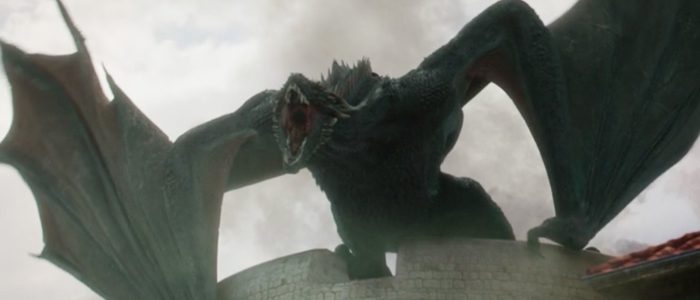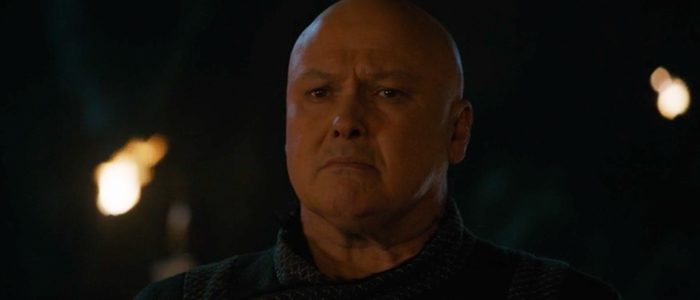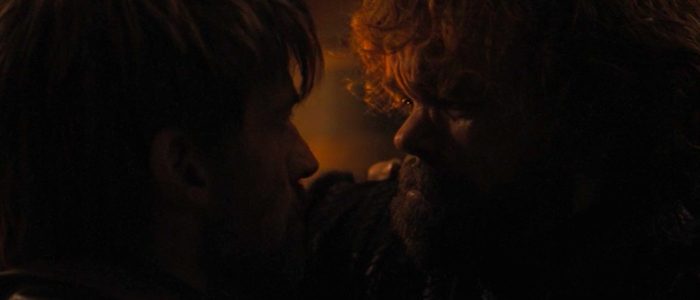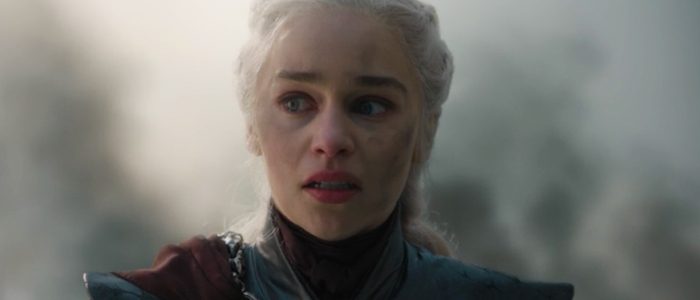‘Game of Thrones’ Delivers Its Most Divisive and Apocalyptic Episode With “The Bells”

Well, that was certainly a thing.
The penultimate episode of Game of Thrones, titled “The Bells,” somehow managed to be more apocalyptic than the episode with the battle against the literal army of the dead. The body count was massive. Characters made ugly and horrible decisions. The landscape of Westeros was forever altered. And there is still one episode left.
/Film’s resident Game of Thrones experts Jacob Hall and Ben Pearson sat down to pick this episode apart and sort through the bodies and the rubble. What happened here? What comes next?

Varys
Jacob: Varys has been saying it since season 1 – he serves the realm. And while it took some people an awfully long time to believe him, he’s always been truthful about his overall intentions when he revealed the cards held closest to his vest. He doesn’t back a particular ideology. He serves no region or House. The Spider has been the only man with any power in Westeros to truly look at the forgotten folks, the peasants, the ordinary people caught in the wars between kings, and work to better their lives. And considering the state of Westeros when the show began, could you blame him for secretly backing the return of the Targaryens?
Of course, we’ve seen his faith waver this season. Perhaps it saw its first crack when Daenerys Targaryen threatened his life during their first consequential dialogue scene in season 7, but it was shattered in “The Last of the Starks” when the truth about Jon Snow’s parentage was revealed and Westeros’ top spy plotted his final and most dangerous betrayal. But Tyrion, still faithful to the Mother of Dragons, sold his colleague out. How sad it was to see Varys hear approaching footsteps and calmly remove his rings and burn his letters, knowing what was coming. How despairing it was to watch him led to the shores of Dragonstone before Daenerys and Jon Snow. How heartbreaking it was to see Tyrion admit that he sold him out and for Varys to not only acknowledge it, but understand and accept the decision of his old friend, colleague, and traveling partner. More than any other player in the game of thrones, Varys knows the rules and he knows the consequences and he knows what happens when you lose. His acceptance of his fate, his understanding of Tyrion’s choice, was a quietly shattering moment in an episode filled with bombast and blood.
Ben, I’ve long held Varys in high regard. He’s straight-up one of the best characters on the show and Conleth Hill has always been a joy to watch. But he was always doomed, right? Despite his shadowy nature, he was ultimately the only person fully working on the side of good and the only person willing to make the hardest possible choices in the name of ending wars, preventing bloodshed, and keeping the realm, and its millions of inhabitants, alive. He was the hero Westeros needed, but not the one it deserves. Watching him getting roasted to death by dragons was the first big clue that “The Bells” was not going to take any prisoners. How did you react to this sequence?
Ben: I honestly never considered Varys to be doomed, for exactly the reason you just laid out: he’s the one person who genuinely puts the interests of the realm above everything else. I figured his unfailing devotion would result in him being one of the few players to survive this series and oversee a new reign in Westeros…but I must have forgotten what show I was watching. The world doesn’t care about justifications. Every character is at the mercy of their rulers, and Varys happens to be at the mercy of one who isn’t in a mercy-granting mood. The world doesn’t care about justifications, and Dany doesn’t care about any good intentions that may have been behind her betrayal. So RIP, Varys. And you better believe that because Dany viewed Varys’s actions as the direct result of a betrayal by Jon Snow, the two former lovers are heading toward a reckoning in the finale.

The Lannister Brothers
Ben: Tyrion’s been waiting almost four seasons to have the chance to pay Jaime back for aiding his escape in the season four finale, and he finally gets his opportunity when Jaime’s been captured outside of King’s Landing. Tyrion’s plan for Jaime and Cersei to flee to Pentos is full of desperation, and both Lannister brothers know in their hearts it won’t work.
And I don’t know about you, Jacob, but their tearful goodbye worked for me. Tyrion reminding the audience that Jaime was the only one who cared for him during their childhood may seem like a forced callback, but for me, it highlighted how these are two characters who, despite some of their twisted previous actions, are opposed to cruelty. Naturally, they’ve each had their own problematic exceptions to that notion, but at this point in the show, it’s basically all coming down to one question: should King’s Landing burn, or shouldn’t it? Both brothers know the right answer, but the trouble is they’re both drawn to powerful women who don’t have the same level of scruples.
What did you think about the final meeting between these two characters?
Jacob: I don’t think it was forced at all. Tyrion may have begun the show as a drunken lout, but we’ve learned over the past eight years that he’s a fragile, warm soul and a kind man who remembers favors and rewards loyalty. Whether his plan for Jaime to abscond with Cersei and surrender the city works or not, he knows one thing for certain: this is the last time the two of them will see one another. He’s pinning his hopes for peace, and the lives of countless innocents, on a brotherly bond he has always believed in, one that is powerful enough to cut through politics and the rivers of blood that surround House Lannister. At the end of the day, as established early and often since the pilot episode, Tyrion and Jaime love one another. Full-stop. No questions asked. If the show didn’t pause for this farewell, this final interaction, it would have been doing them a disservice. Jaime is too broken to take credit for his good deeds, but we can count among them keeping Tyrion alive in a world designed to break him and kill him.

Daenerys, War Criminal
Ben: Did you hear the resigned nature in Dany’s voice when she executed Varys? She took no pleasure in that act. There was no righteous vengeance in her tone. In that moment, more than anyone else, Dany reminded me of Ned Stark, the honorable man who explained to his sons in the show’s first episode that they ought to be the ones to swing the sword during executions. Killing Varys was the act of a woman who long ago accepted that collateral damage would be necessary in her quest to regain the throne she views as rightfully hers.
So for me, it wasn’t shocking to see her take that mentality to the next level by setting King’s Landing aflame, even after the bells of surrender rang out across the city. She’s had everything ripped away from her – not just the throne and her entire childhood, but the people closest to her – so while I obviously don’t agree with her decision to burn thousands of innocent people, the show has laid plenty of track to get us to that moment. (And I thought director Miguel Sapochnik, much maligned online for directing the admittedly-hard-to-see Battle of Winterfell episode, directed the hell out of this episode and left nothing to the imagination this time.)
What did you think about the way the episode handled Dany’s big decision?
Jacob: Game of Thrones, and George R.R. Martin’s original A Song of Ice and Fire novels, always bring to mind a quote attributed to Napoleon Bonaparte: “History is a set of lies agreed upon.” The tales told, the songs sung, and textbooks written come years after the blood has been shed and the smoke has cleared. What is truth, what is forgotten, and what gets remembered is decided upon those who shake hands, agree on the version of the tale that is suitable for print, and move on to further polish the rough spots out of their legacies.
Daenerys’ brutal evisceration of King’s Landing begins heroically enough. No longer under assault in an ambush, she is able to destroy the dragon-killing Scorpion siege weapons. She burns the Iron Fleet. She roasts the Golden Company. She tears down the walls and front gates of the city, allowing the Unsullied, the Dothraki, and the Northern forces immediate entry. It’s another fist-pumping moment. Another victory for the Dragon Queen. Another conquest for our hero.
Except that Daenerys is not the hero of battle. She’s the villain. She’s the monster we’ve all been worried about. Remember that she burnt a woman to death for betraying her in season 1. Remember that she locked two people in a safe to starve to death in season 2. Remember that she sacked cities and killed countless people as part of a moral crusade that led to unresolved civil unrest across an entire region. But we cheered her on. Because she was the plucky heroine, the young woman who rose up against a corrupt world, said “No” and burned the old order to the ground. We cheered on acts of incredible violence and destruction because it felt right. Because we were on the ground with her. Because we were asked to sit in her righteous point-of-view.
Remember how she was greeted when she conquered Meereen? A crowd of thousands greeted her at the gate, having forcefully overthrown the city leadership upon her arrival. They lifted her above their heads, called her mother, and declared her their new ruler. A reception for a proper queen, especially one with a trio of dragons and the most famous name in several continents. A reception in line with the tales she was fed from a young age: that the people of Westeros secretly toasted the Targaryen line, eagerly awaited their return, and would offer their swords and vows the moment she set foot in the Seven Kingdoms again. And since her arrival in Dragonstone last season, none of these promises have come true. She’s walked into a quagmire where few houses are ready to commit. The queen in the South wants to destroy her. The king in the North is more worried about an invasion of the undead. And the people? As we have glimpsed throughout the season, the people are skeptical at best. They want to know how they will eat this winter. They have no interest in bowing before a queen they have never seen and her foreign army.
Perhaps the speedy pacing of this season did this transition a disservice on some levels, but the seeds were all there. A woman expecting a kingdom to fold over and place a crown on her head within moments of arrival instead finds it disinterested and hostile. There exists a secret Targaryen with a better claim to the throne. Her advisors are proving less than useful and her most trusted confidants, her moral compasses (not to mention two of her dragons) die awful deaths. For years, Daenerys has threatened to burn cities to the ground and destroy all who oppose her. For seasons, we took that as the badass posturing of a hero with a moral agenda, not a dangerous woman whose worst impulses require constant checks (and Jon Snow may be many things, but his backbone is awfully brittle when it comes to standing up to her).
And so Daenerys Targaryen overlooks a helpless and mostly defenseless King’s Landing, a city of a million people (plus countless thousands of refugees) who have not welcomed her with open arms. A city of a million people who flocked within the walls, within the protection of Queen Cersei, rather than call her “Mhysa.” Daenerys did not find the love she was promised, nor the easy campaign she expected. So when she sits there, fuming and bitter and thinking that the only way to win the respect of the Seven Kingdoms is fear because love certainly isn’t going to enter into it, she makes an awful choice. An unforgivable choice. She destroys the city. She destroys the Red Keep. She massacres countless innocent people because she is Daenerys of House Targaryen and her House is that of fire and blood.
I know I’m going long here, Ben. But Napoleon called history a lie agreed upon and after witnessing Daenerys transform into the monster that others have worried she would become for years and years, my mind scrambled to think of how the maesters will record this one. Maybe the series ends with her on the Iron Throne and the stories tell of the brave Dragon Queen who led a glorious battle after freeing the slaves across the Narrow Sea, omitting the burning families in the streets and the casual disregard for those bells of surrender – because what kind of glorious queen commits such crimes against her own people? Or maybe the series ends with Daenerys dead or imprisoned and the songs tell of the Mad Queen, who massacred entire cities in Essos before turning her rage on King’s Landing, and this version omits her hard-won triumphs, her noble goals, her friendships and romances and everything that made her so human, everything that made us want to be on her side before she made this terrible and unforgivable choice to choose fear above all else.
In either case, we lose half the story. In either case, the tale of Daenerys Targaryen is a tragedy. It’s a betrayal. A punch to the gut. A reminder that history is written by the winners with the blood of the losers. And we are the only witnesses to the whole story.
Continue Reading The Bells >>
The post ‘Game of Thrones’ Delivers Its Most Divisive and Apocalyptic Episode With “The Bells” appeared first on /Film.
from /Film http://bit.ly/2Vlrv7T
No comments: